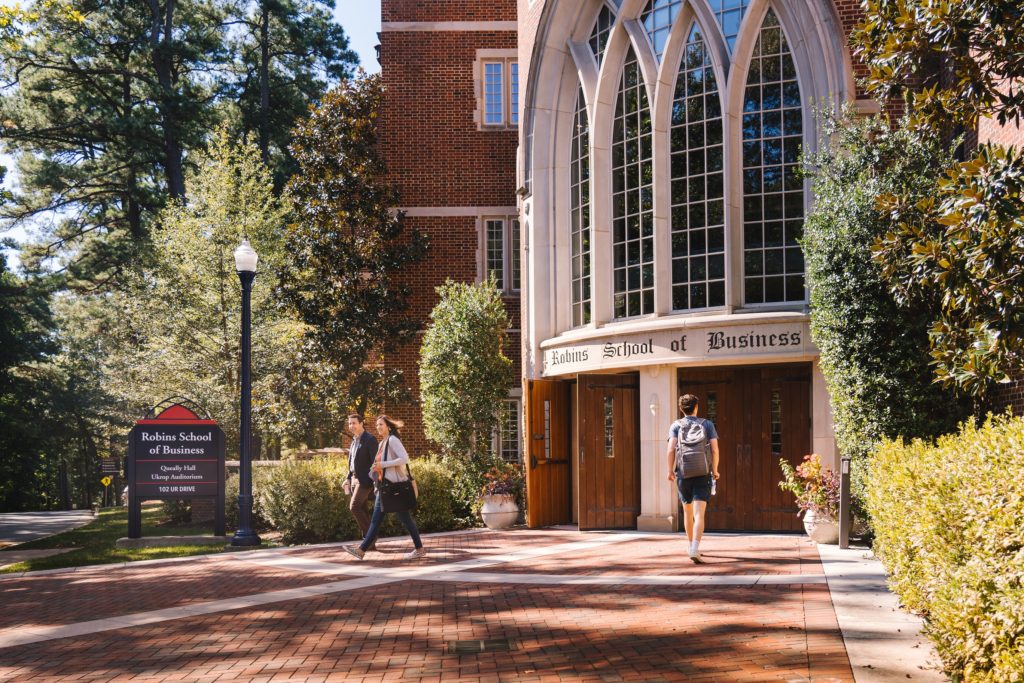
Robins School of Business at University of Richmond has posted among the highest undergrad employment rates for the last three years. (University of Richmond photo)
Asked to think of a university mascot, you’re probably first picturing some kind of animal. Besides the odd tree (looking at you, Stanford); viking, trojan or cowboy; or Western Kentucky’s Big Red furry, the lion’s share of mascots are, well, lions. Or tigers. Or any other large-ish mammal.
Not at the University of Richmond. Its mascot is named WebstUR, and it pays homage to an animal tiny but mighty, maybe a little creepy: “In nature, spiders are known for their tenacity and grit, their unexpected sociability, and the strength of the webs they work so diligently to create,” reads WebstUR’s webpage, which also claims that UR is the only university to have an Arachnid Araneae for a mascot.
And, the Spider Network is the university’s web of alum, faculty, career professionals, and industry practitioners who help connect students with internships, advice, and those all important post-graduate jobs.
“The Spider Network is a real thing. It is amazing … Alums want to know what (students) are up to, what they are doing, and how they can help. They are just very loyal,” says Mickey Quiñones, now in his fifth year as dean of University of Richmond’s Robins School of Business.
“I put it back to the experience that they had at Robins and the impact that has had on their career. They want to pay it forward.”
ROBINS SCHOOL’S IMPRESSIVE CAREER OUTCOMES
There certainly seems to be something to the Spider Network. For the past three years in Poets&Quants For Undergrads ranking of the best undergraduate business schools, Robins School graduates have posted increasingly impressive career outcomes, including full-time employment rates that are consistently top of class.
The University of Richmond is a private, liberal arts school with about 3,500 undergraduates – around 35% of whom graduate from the Robins School. The B-school has 80 tenure-track faculty members and 90-some total faculty, allowing for small class sizes and individual attention. It offers degrees in Accounting, Economics, and Bachelor of Science in Business Administration, as well as minors in business admin and entrepreneurship. The BSBA also offers eight concentrations including business analytics, international business, management consulting, and entrepreneurship.
Out of 91 undergrad B-schools we ranked for 2024, Robins was one of only two schools to report full employment for all Class of 2023 job-seeking graduates. That means that 100% of graduates who were looking for full time jobs found them within three months of walking across the stage.
It also scored in the top 21 schools for internships with 95.5% of Class of 2022 and 2023 graduates having at least one business related internship before leaving school. And, it was 23rd in average first-year compensation at $82,539, after factoring in average first-year salaries and signing bonuses.
But, Robins’ success in placing graduates in good first-time jobs – arguably one of the most compelling reasons for pursuing an undergraduate business degree – puts it at the top of the pack. In fact, its last three classes have reported among the highest employment rates in our ranking: 100% for the Class of 2021, 98.8% for 2022, and 100% for 2023.
Poets&Quants recently sat down with Dean Quiñones to talk about the programs, courses, and networks that help Robins graduates launch their careers. Our conversation has been edited for length and clarity.
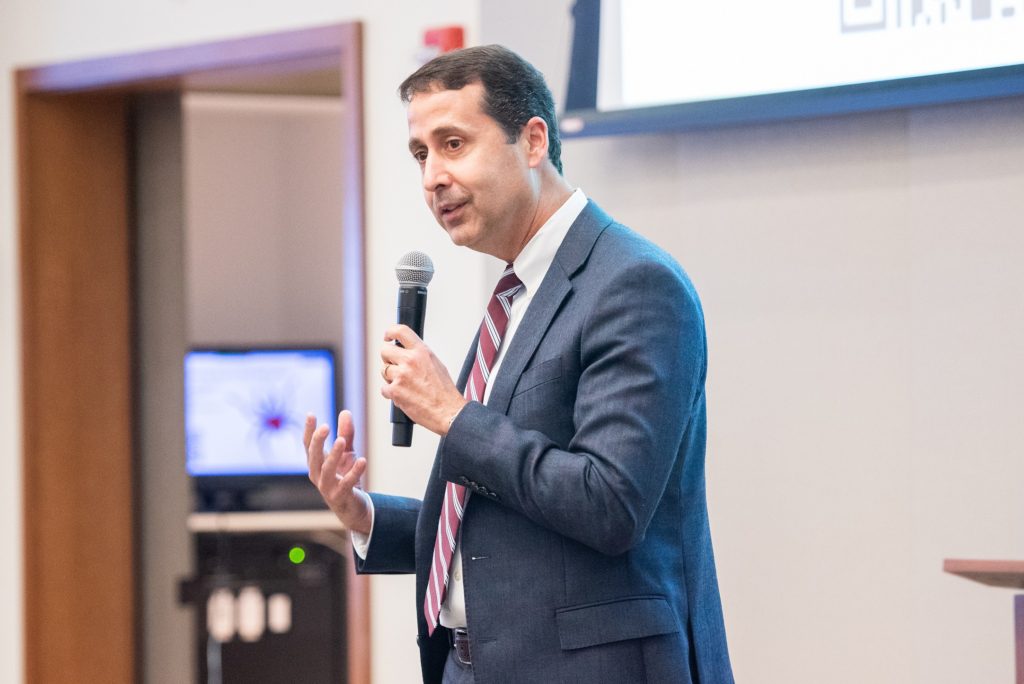
Dean Mickey Quiñones speaks at Bench Top Innovations Bake Off, part of an innovative experiential course in which undergrads design, manufacture, market, and launch their own food and beverage product. (University of Richmond photo)
In terms of career outcomes, most notably your high employment rates over the last several years, what do you think sets you apart as an undergraduate business school?
I hold out three things that I think are indicative of our career outcomes: One is excellent academic preparation. Our students get a broad preparation because of the foundation in the liberal arts. They understand the context under which business operates. They learn the communication and analytical skills required to solve any problem within the liberal arts foundation.
We also have small classes. I always tell parents, “You can’t hide in a class of 20.” Students are constantly having to be prepared to think critically in order to defend their position, so they get a really robust academic preparation.
The second one is they have practical hands-on experience, which I will go into detail on a bit later.
And I think the third is close mentorships with faculty, staff, and a whole community of mentors that really prepare them well for careers.
Is employment after graduation a strategic focus of your school, or is it more of just an outcome of the program you’ve built?
Well, that’s a really good question. I would say it’s an outcome of our focus on four things: excellence, relevance, impact, and community.
Excellence, always striving to be better – inside the classroom, outside of the classroom, and pushing our students to be better.
Relevant, making sure that our curriculum and our preparation is meeting the needs of the world.
Impact on our students, on our community, on the organizations in which they work. I consistently get feedback from employers, whether they be alums or others, on how well our students stand out. They’re Day One ready. They’re able to roll up their sleeves and do what’s needed. They’re proactive.
And community, build a community that challenges but supports our students.
So, I think our good employment record is an outcome of that because we’re focused on things that matter.
Tell me about Robins’ career readiness program, Q-camp.
Q-camp is a two-day career development workshop, usually in the second semester of sophomore year. Students spend a night in a hotel nearby, and they learn everything from carrying on a business conversation, learning table manners and etiquette for business meals, doing small talk, etc.
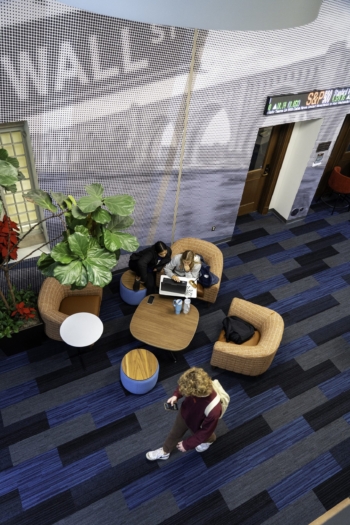
Robins School students study in the school lobby. (University of Richmond photo)
They do some self awareness work through various assessments, they have mock interviews, and we have breakout sessions on different industries. They are surrounded by volunteers – whether it be faculty, staff, alumni and corporate partners – who are working with them to understand what’s going on in the labor market. So they really get well prepared on how to carry themselves in a professional manner.
That’s one of many things we do from a career preparation standpoint, and I would say that’s a signature Robins experience.
What are some other career prep activities Robins has for students?
We have very strong centralized Career Services at the university level, but we have a person in the business school as well to run the Center for Professional Skills Development. My team and I meet with career services every month to coordinate activities. They have people in the building three times a week.
We also have Executives in Residence, Founders in Residence, Entrepreneurs In Residence, and more. We have many mentorship programs. Students are just surrounded by opportunities to really connect with people from various industries who have taken various paths.
I have two kids in college, so I totally understand how all they know is what they’ve seen. They’ve seen what I do, what my wife does, and maybe what some of their friends’ parents do. We need to surround students with people who have had different paths and have had different careers so they can see, “Oh, this person started here and they ended up over here. How did that happen?” That gives them the confidence and the creativity to think differently about their own careers.
Are these career opportunities things the undergrads have to opt into, or is any of it built into the curriculum?
It varies. A lot of them are opt in. A lot of students that come to the university, and into the business school in particular, are very driven. They opt in because they are wanting to go out and make a difference.
I like to say that we have all the opportunities of a large school with the access of a small university. When I first got here, I met with one of our Executives in Residence and he said, “The way I would describe University of Richmond and the Robins School is that we’re artisanal, we’re not mass production. We care about every student and we understand their needs.”
Some things that are required are, for example, Career Services works with the first year seminars and some of the earlier classes to make sure that they understand how to get on Handshake, how to work on their resume, etc.
One of the required classes here is Business Communication and, as part of the curriculum, they have to work on their resume, learn to write a business letter, write emails, and how to leave a voicemail. They learn both good oral and written communication.
There must be something in the Robins culture, too, that urges students to opt in to these opportunities.
I think that’s exactly right. There’s something about the Spider Spirit. I partly attribute that to just having such a large faculty and staff relative to the number of students. Everything is right there, it’s accessible, and they see their peers doing these things and they opt in for these things themselves.
We have one building for Robins, so I joke that I can sort of put my arms around my school building. I can walk the halls and see students and get to know them. Our faculty knows their situations and knows how to push and support them.
I think that the culture that’s created by having high levels of opportunities relative to the number of students, it’s almost like you can’t avoid it.
One more thing about culture is we are obsessively student centered, including when we hire people. And since I’ve been here, I’ve been involved in hiring 28% of our tenure track faculty. That translates in our faculty and staff focusing on the needs of students and making sure they are well prepared.
Tell me about experiential learning opportunities for Robins undergrads.
We created the Spider Business Hub as a one stop shop for client based projects. Our faculty member director goes out and curates projects in the city, both profit and nonprofit, from large and small companies, which tend to focus on underserved communities. Faculty who want to bring an experiential project into their classes don’t have to go out and beat the bushes, they can go to the hub. Students can individually go in and access those projects as well.
We started that three years ago, and about 20-some students were involved. By the third year, 400-some students were involved. We would like to increase that.
We also have things like the Student Managed Investment Fund. As part of that, students get to visit some of our alums and top investment houses in New York. We have a bunch of other trips like that, whether it be for entrepreneurship oriented students, marketing oriented students, public service oriented students, and so on. We want to make sure our students are exposed to the industries they are interested in working in.
In fact, I was just talking to a faculty member who took a group of students up to Washington for a sports industry networking and career conference. It’s amazing the people that they got to hobnob with. There were like 25 to 30 other universities representing, and people kept coming up to our faculty, unsolicited, and telling them that the Robins students were amazing.
We also participate in several case competitions. We’ve traditionally done really well in the National Team Selling Competition, and we won the very first year we competed in the National Diversity Case Competition. For a small school, our students just outperform.
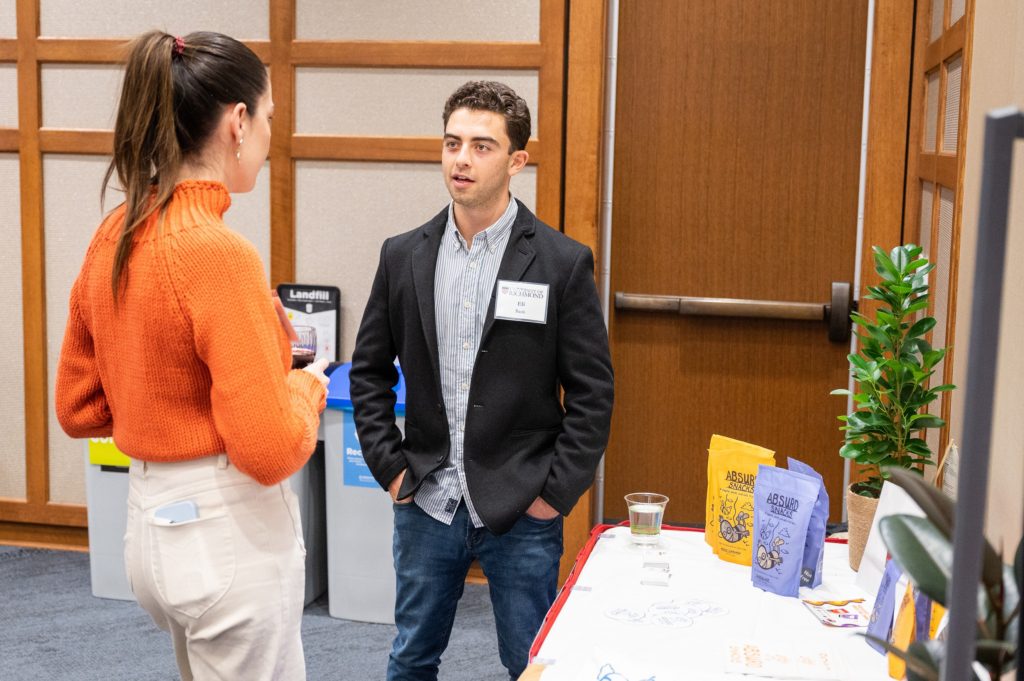
Robins alumni Eli Bank, co-founder of Absurd Snacks, at a Bench Top Innovations event. The bean-based, allergen free snacks created as part of the Bench Top course are now sold at Whole Foods and Amazon.com. (University of Richmond photo)
What are some interesting or unique experiential courses offered at Robins?
We have a course called Bench Top Innovations which is really fascinating. Three years ago, one of our marketing faculty and one of our Executives in Residence proposed a class where a group of 16 students would work over two semesters to develop and launch a food or beverage product.
Students are divided into four teams of four, and they spend the first semester creating and developing their product. They work with a food scientist, and we have a commercial kitchen that they make available to the students. They just start experimenting with recipes and figuring out what they want to do. And then they have a Bake Off in November. We have a couple hundred people come to watch and we have judges. It’s a big deal.
Then, the entire class coalesces around the winning product for the rest of the year. The students manufacture it, commercialize it, and launch it.
We’re now in our third product. The first product is called Absurd Snacks, and it’s an allergen free, bean-based trail mix. Two students from that team, this is what they do now for a living. They’re running this organization.
Absurd Snacks is now in Whole Foods. They’re on Amazon, and we’ve been able to mentor them and support them. They are our Startup in Residence, so they work with our current students. They hired some of our students as interns using the Richmond Guarantee.
What is the Richmond Guarantee?
That is another thing that I think is unique to the University of Richmond. Every student at the university has access to $5,000 for an unpaid or an underpaid internship. We actually connect with startups in the city that don’t have a lot of money for internships.
And students can use it for research projects as well?
It can be for anything. So in the sciences, they’re used for working in the labs. Because we don’t have PhD programs, our scientists – in biology, chemistry, physics – all their research is done with undergraduate students. They’re producing top level research with undergrads.
For our students, one of the uses that we found for the guarantee is we partner with Startup Virginia. Our Career Services works with them to craft well defined internships and matches students with the startups to work over the summer.
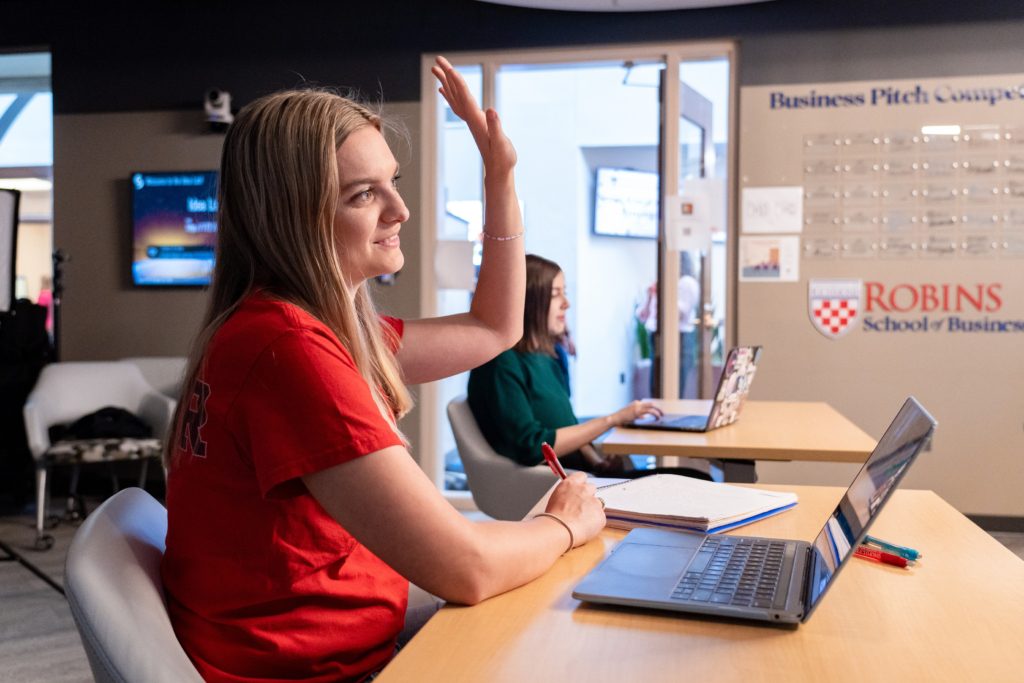
Robins School student in its Innovation Lab (iLab). (University of Richmond photo)
Would you say entrepreneurial type pursuits are becoming more popular with Robins students?
I would say so. Certainly judging by the number of students that come to this Bake Off and they all are very excited about that. A lot of students do end up in more traditional roles, but over the years, I’ve seen more students who do both. They have a kind of side hustle. We’ve had students who run clothing companies out of their dorms. I had another student who was producing music and had clients throughout the country. They are very entrepreneurial in that way.
I think entrepreneurship in general, especially on the startup side, is good training because it’s kind of like the primordial soup of business. Everybody’s doing the nascent stuff. Everybody’s in business development and innovation and in production. You’re kind of seeing it all at the core level.
And when students are running these food and beverage companies, they’re doing it. They see the cost, they see what accounts are doing, how many orders they are getting, what the margins are. They see the impact of their postings on social media. They see the effectiveness of different marketing campaigns.
So, when it’s time for Robins students to actually hunt for that first job after graduation, what kind of help or support do they get from the school?
It starts on Day One. We have programs like Deconstructing Wall Street or Deconstructing Health Care or whatever with panels that explain all the different jobs in a particular industry. We have mock interviews and get everyone connected and familiar with Handshake.
We also have our Spider Network. The Career Services people and our professors are connected to alums from all over. And Career Services is there for life for our students.
Again, it’s that idea of being artisanal. It’s that connection that we have. Our Executives in Residence really push students to be prepared and how to kind of hustle and find the opportunities.
Do you find your alums are eager to meet with students for coffee or just answer their questions?
Yes, the Spider Network is a real thing. It is amazing. When I go with the students to New York for the Student Managed Investment Fund group, we have a big alumni event. And the students are the stars. The alums want to know what they’re up to, what they are doing, and how they can help. They’re just very loyal.
I put it back to the experience that they had at Robins and the impact that has had on their career. They want to pay it forward.
Anything else you’d like to add?
I just really think Robins is a truly special place. You know, I meet deans from all over, and I know we all are wired to brag about our school. But there is just something special and different here. Our students just continue to surprise and impress me.
DON’T MISS: ALL THE EMPLOYMENT & INTERNSHIP DATA REPORTED IN OUR 2024 UNDERGRAD B-SCHOOL RANKING AND MARYLAND SMITH UNVEILS AN AI JOBS MAP WITH 90% ACCURACY











Questions about this article? Email us or leave a comment below.